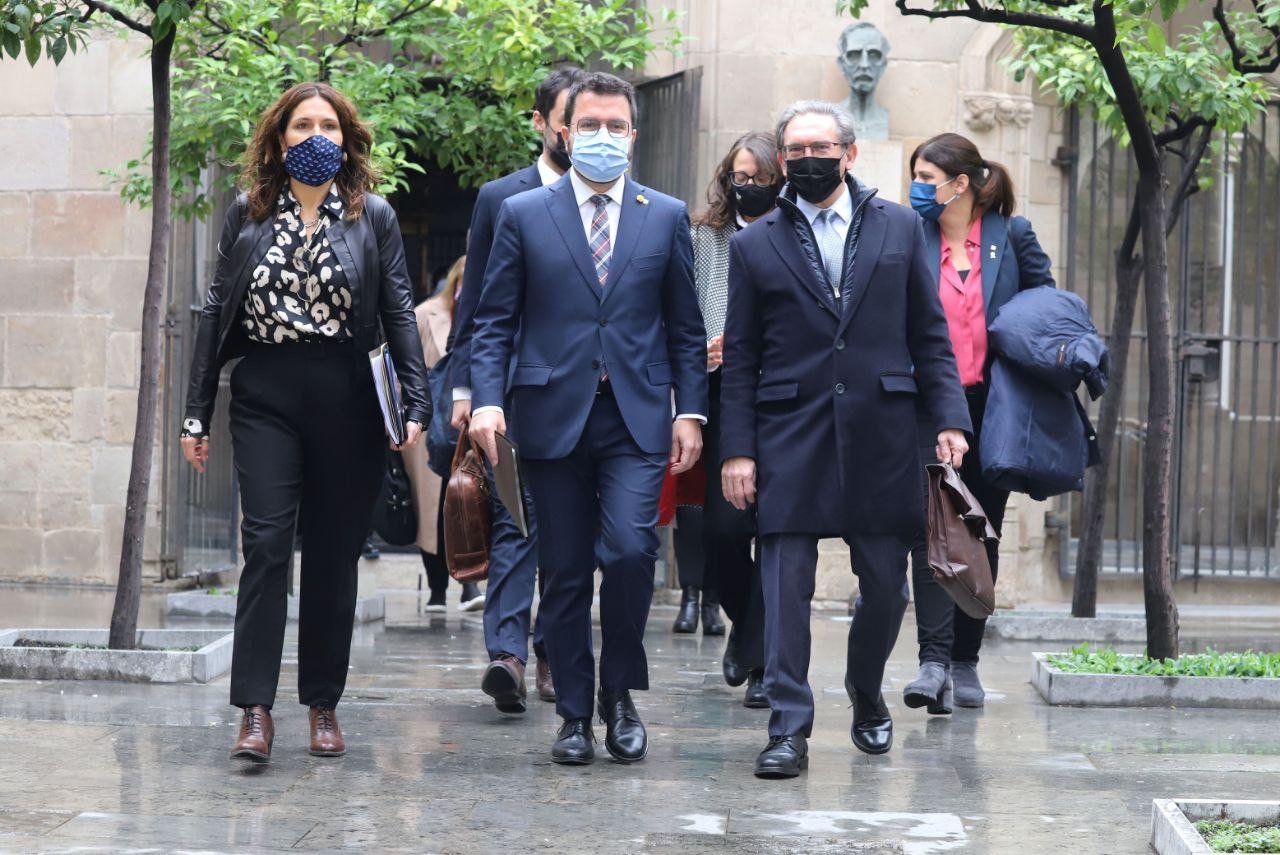It's a key weekend for the future of Catalonia's 2022 budget. The Catalan government sent a new proposal to the CUP on Thursday to try to get the left-wing, pro-independence group to support its draft budget, which next week faces its first parliamentary debate and vote. In the latest proposal, the executive makes a number of new commitments: it will not assume any new Catalan government cost in the CRT-Vilaseca project (Port Aventura) and nor will it formalize a candidacy for the Winter Olympic Games without the approval of the territory affected. The CUP is to decide its position on the budget via open parliamentary assemblies with its members, which have begun today Friday and are to continue over Saturday and Sunday.
The 11-page Catalan government text, which was sent to the CUP last night, also responds to the anti-capitalist deputies' demands on the operational policies affecting the Mossos d'Esquadra riot squads, and includes the Catalan government's decision to withdraw the private criminal prosecutions against protesters when there is no evidence of injury to any worker or public worker or if the authorship of such injury cannot be proven. The CUP grassroots will consider the content of the new offer as they hold assemblies over the weekend.
The text provides for the inclusion of an additional provision in the proposed budget law which establishes that the Generalitat of Catalonia "will not assume, under any circumstances, any costs for the Vilaseca Recreational and Tourist Centre" - that is, the plan by the Hard Rock entertainment company to create a hotel-casino based tourist complex, near the Port Aventura theme park in Tarragona province.
Another additional provision would specify that "the government will not formalize any candidacy for the Winter Olympics until the public consultation on this project scheduled for 2022 has been carried out." In fact, the budget of the presidency department includes 800,000 euros for the holding of a participatory process.
Police riot units
In the law and order area, the Catalan executive states that "it shares the proposal that the use of the ARRO and BRIMO riot units in home evictions should be limited as much as possible, with the best method being to use all the preventive instruments available, but without forgetting the obligatory fulfillment of the mandate to protect the judicial entourage”.
The executive commits itself to "deploying a standard working protocol for the Mossos d'Esquadra in operations carried out under court orders during a home eviction, under which there will be a strengthening of the police body's ability to detect situations of vulnerability in advance and [apply] principles of minimum intervention and proportionality".
In this regard, there will be monitoring of the cases in which the participation of the ARRO or BRIMO does, in the end, take place.
The document also includes the possible internalization of the 112 emergency service; the withdrawal of the Catalan government's private prosecutions in seven cases resulting from the incidents of January 30th, 2018, which became effective on Thursday; and the systematic review of court procedures open in which the Catalan government is presenting a private prosecution, in order to "withdraw those accusations in cases where there is no evidence of injuries being sustained by any public worker, or where authorship of any such injuries cannot be proven".
Housing and Health
The text includes proposals on housing policy, to which the Catalan government allocates a total of 749 million euros for 2022, a figure that represents an increase of 410 million over the last budget. The proposal addresses the acceleration of housing construction for social rental accommodation, with an initial injection of 80 million euros that will allow the construction of 2,000 new homes, as well as household rental assistance which will benefit 53,000 families.
In the field of health, the proposal includes the section on the internalization of the 061 Health Respond service, through an additional provision. The proposal also points to measures to strengthen primary care.
Education
In education, the proposal of commitments made with respect to the budget includes a progressive reduction of teaching ratios in the infant and primary cycles, from 25 to 20 students per classroom, the hiring of 1,545 new professionals, and the reduction of the ratio for the first-year infant class, P3, with a maximum of 20 three-year-old students per class, which will involve the creation of 493 new class groups and an increase of 56.8 million euros in this budget item. Also in this section is the progressive provision of free education from 0 to 3 years, starting with the P2 level in the next school year and the improvement of nursery schools.
In social policy, the plan to combat energy poverty and guarantee minimum services appears, which increasing spending on the item from 7.2 to 13 million euros; and the modification of the guaranteed minimum income, with an increase of 11 million to the endowment that will reach 230,000 beneficiaries; in addition to 13.9 million euros to alleviate homelessness.
In energy policy, a sum of 500,000 euros is inserted for the design and deployment of the Catalan public energy company announced earlier this week, which will take place during the first half of 2022. “The first task of this public company will be to establish a work plan for the period 2022-2024 which must include, as a minimum, the paths to start production, rescue, transport, marketing, and participation in communities and budget allocations to bring it about”.
In the main image, Catalan president Pere Aragonès and economy minister Jaume Giró this morning in the 'Pati dels Tarongers' before a meeting of the Catalan cabinet / Rubén Moreno

